Aeneas and the New Troy
October 9, 2013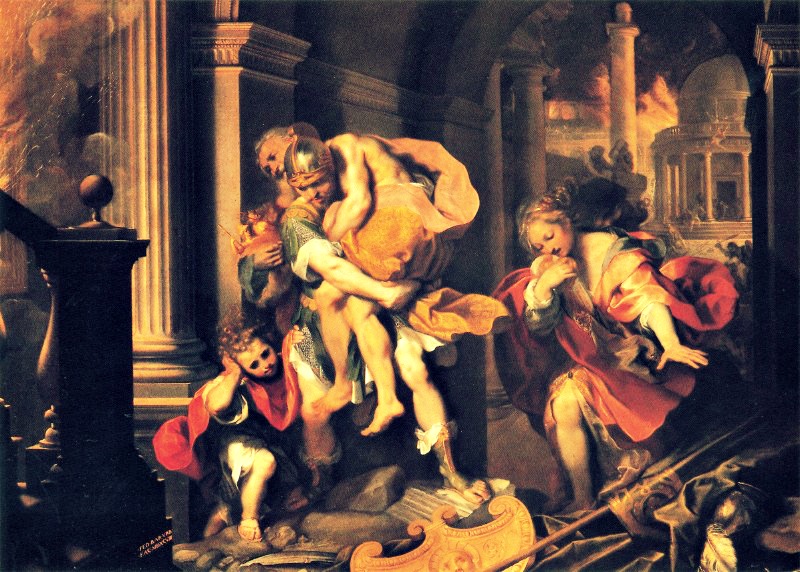
Aeneas Fleeing from Troy (1598) by Federico Barocci (Source – Yale University)
Aeneas was an accomplished Trojan warrior second in ability only to his cousin, the great Hector. After the fall of Troy at the hands of the Greeks, he took a small band of survivors on a journey to find a somewhere else to live; a land where they would build a new Troy, a nation that would go on to dominate the known world.
At the outset the Trojans had a fearsome enemy, the goddess Juno, who had been told that the nation state that they would lay the foundations for would one day bring about the downfall of her favoured people, the Carthaginians. She devised a plan to stop them fulfilling this destiny and at her request, the ships of the Trojans were driven by mighty storms to the shores of the great city of Carthage itself.
When they landed, the Trojans were welcomed by the beautiful widowed queen, Dido. In a bid to help Juno stop Aeneas fulfilling his destiny and instead have a happy life in Carthage, his mother Venus sent Cupid to shoot one of his arrows into the hearts of the queen and her guest so as soon as they set eyes on each other, they fell deeply in love.
The Fall of Troy
Dido invited him and his group to feast with her and at the end of the festivities, she asked him to relate to her how his city had fallen. He agreed and began by explaining that it was when they thought they had won victory, they cruelly had it snatched away. He told her of the giant wooden horse that the Greeks had given them as a peace offering, only to betray that peace with warriors hidden inside it who attacked the Trojans as they celebrated.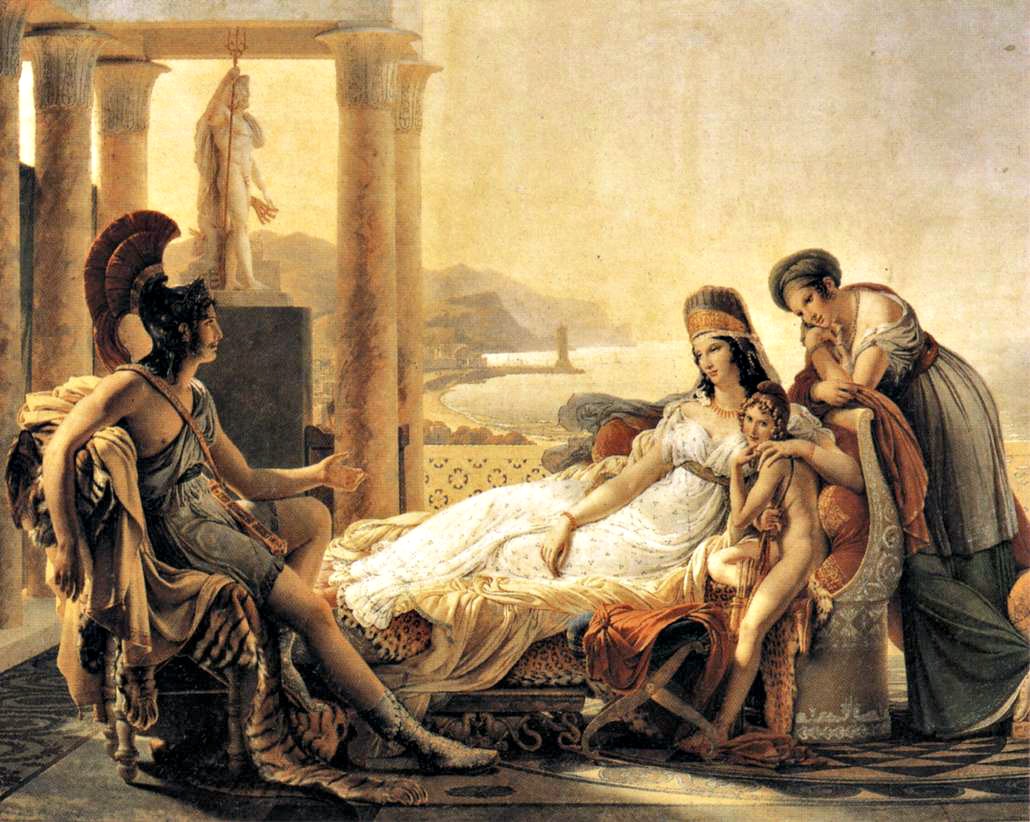
Aeneas tells Dido about the fall of Troy (c.1815) by Pierre-Narcisse Guérin (Source – Georgia
Regents University)
Inebriated, they were powerless to stop the ensuing slaughter and so, he warned her; “Beware forever of Greeks bearing gifts”. Though he fought bravely to prevent the fall of Troy, Aeneas was powerless to stop the annulation of his people. When all was lost, the ghost of Hector appeared to him and told him that he must leave that place and lay the foundations for a new Troy, which unbeknown to him at the time would later become the Roman Empire.
The Adventures En Route to Carthage
Aeneas relayed to the queen accounts of the adventures they had while en route to Carthage. He told her of their time in Thrace, where they found the spirit of Polydorus, the son of the now dead king of Troy Priam and how they helped it escape being trapped in a shrub by performing proper burial rites.He then tells the beautiful woman before him of the time they spent on Crete, where they believed they were supposed to build their new Troy. However when the area was hit by drought and disease, they received a visit from household spirits who informed them that Italy was the place they needed to be. Their next stop was the Strophades island group where they encountered Harpies, half bird, half women beasts who would fly past and defecate on their food whenever they tried to eat.
At Buthrotum in Epirus they met up with another son of their former king called Helenus, who had built his own new Troy with the widow of Hector, Andromache. As a prophet, Helenus was able to warn his fellow countrymen of the perils they would go on to face and told Aeneas that he will know that he has made it to his destination when he sees a white sow and thirty piglets in an oak grove.
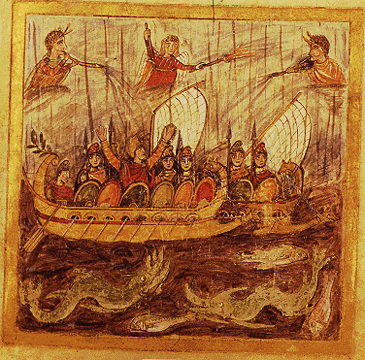
The Tempest, an ancient depiction of Aeneas’ fleet being blown off course
to Carthage (Source – Tyler Junior College)
Finally, before reaching Carthage they had met up with Achaemendies who warned them of Polyphemus, a man eating Cyclops who promptly appeared causing them to flee in terror to Sicily. While there, Anchises, Aeneas’s father died and after mourning his death, the Trojans had got back in their ships and were blown off course, thus finding themselves in Carthage.
The Tragic Love of Aeneas and Dido
The day after their arrival, the group joined the queen on a royal hunt and as soon as they had the chance, Aeneas and Dido slipped away from the others and found a quiet cave where they swore their undying love for each other and planned to wed. From that day, Juno’s plan seemed to work and the two were inseparable.He sat beside her as a king and the two build great temples and structures until one day, Mercury, the messenger of the gods, appeared before him sent by the lord of all gods Jupiter and demanded that he complete the task that he had been set. Reluctantly, the ever dutiful Aeneas agreed and prepared his ships to leave Carthage and his wife behind.
When she found out what was happening, Dido was furious and she swore to him that if he left her, she would pray to the gods that any nation he founded would be the eternal enemy of Carthage. Not wanting to leave the woman he loved or have her people as his enemies, this made it all the more difficult for Aeneas but as a loyal subject of the gods, he knew he had to go. Dido was inconsolable as she watched her true love sail away from her and not wanting to go on alone, she took her own life.
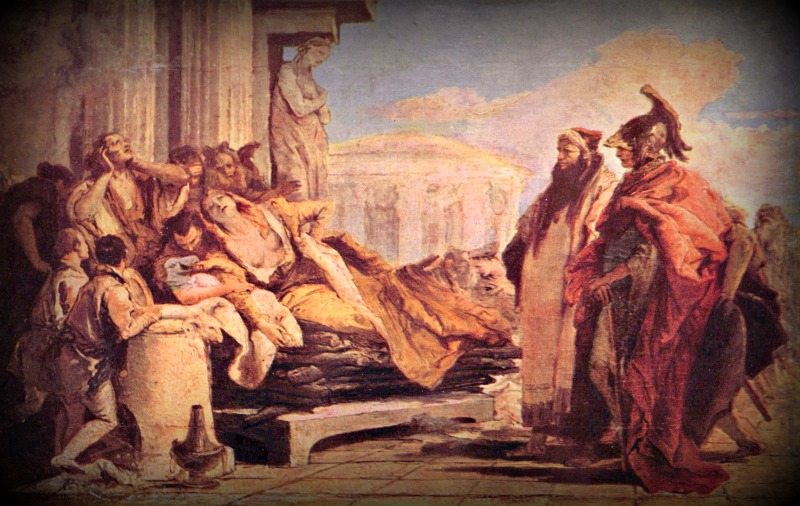
The Death of Dido (1757) by G.B. Tiepolo (Source – Georgia Regents University)
Aeneas and the Underworld
Before building his new nation, Aeneas had to take a trip to the underworld in order to learn his true mission. While there, he was reunited with his father who accompanied him into the depths of Hades. Anchises explained to his son that his mission was not in fact to build a new Troy, but to build the foundations of a new city state, Rome, which would grow over a number of generations to be greater than any Empire the world had ever seen.His father showed him a line of souls waiting to be reincarnated and when asked who they were, Aeneas was told that they would become his descendants. They were the most prodigious of men that would follow him and would go on to make the new nation great and included amongst their number;
- Romulus, who would found the city of Rome
- Lucius Junius Brutus, who would become a hero of the early Republic
- Scipio Africanus, the general who would defeat Hannibal at Battle of Zama
- Scipio Aemilianus Africanus, the general who would go on to lead the final siege and destruction of Carthage
- Julius Caesar, who would add vast amounts of territories to the empire and be a great leader, loved by all the people
- Caesar Augustus, who would rule in the hay-day of the Roman Empire
War with Turnus of the Rutuli
When he left the underworld, Aeneas knew clearly what his true mission was and soon after his ships landed a short distance from the mouth of the River Tiber, where Rome would later be located. This small region was led by King Latinus, who welcomed the newcomers and proposed a marriage alliance between the leader of the Trojan fleet and his daughter, Lavinia. Nearby, there also lived a small community of Greeks led by Evander of Pallene who also welcomed the new arrivals with open arms however not everyone was so eager to greet them.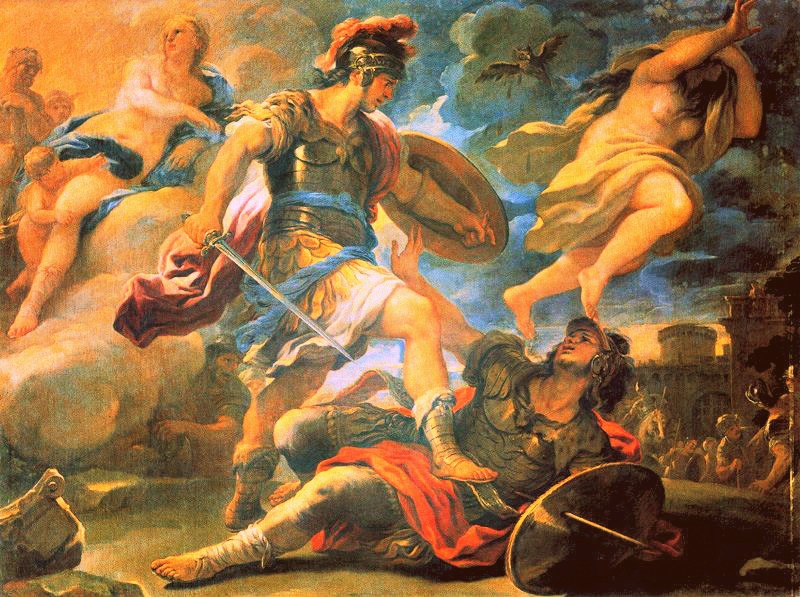
Aeneas defeats Turnus (17th century) by Luca Giordano (Source – Wikipedia)
Latinus’s wife was furious that her husband had offered up their daughter in marriage to these strangers and another nearby leader, Turnus of the Rutuli, was also hateful of them as Lavinia had previously been promised to him. As the son of Venus, Aeneas had a goddess on his side however as Juno despised the Trojans, he also had one against him. As a result, Jupiter decided that the gods would stay out of the conflict and fate alone would decide the victor.
War ensued and the Trojans were heavily outnumbered so Aeneas headed off to see Evander to gain support for his war effort. In his absence, Turnus and his allies attacked and laid heavy siege to the stronghold of the Trojans however, their leader arrived back in the nick of time with thirty ships which balanced out the sides, leading to a very bloody series of battles.
The war raged on with both sides suffering heavy losses until eventually, Turnus challenged Aeneas to a duel. The two fought bravely but in the end, the Trojan leader was victorious and after killing Turnus, the war ended and he married Lavinia. Together they went on to found a settlement near the Tiber called Lavinium which would, as had been prophesised, be the parent town of the new nation state they had set out to found, Rome.
References
Aeneas. [Internet]. 2013. Britannica. Available from: http://www.britannica.com/EBchecked/topic/7113/Aeneas [Accessed October 7, 2013].Holoka, J. P. [Internet]. 2006. Study Guild to the Aeneid of Vergil. Eastern Michigan University. Available from: http://people.emich.edu/jholoka/sg-verg.htm [Accessed October 7, 2013].
Rufus Fears, J. [Video Lecture]. 2011. TTC - Life Lessons From The Great Myths. Whitman College
Posted by Andrew Griffiths. Posted In : Roman Foundation Myths
